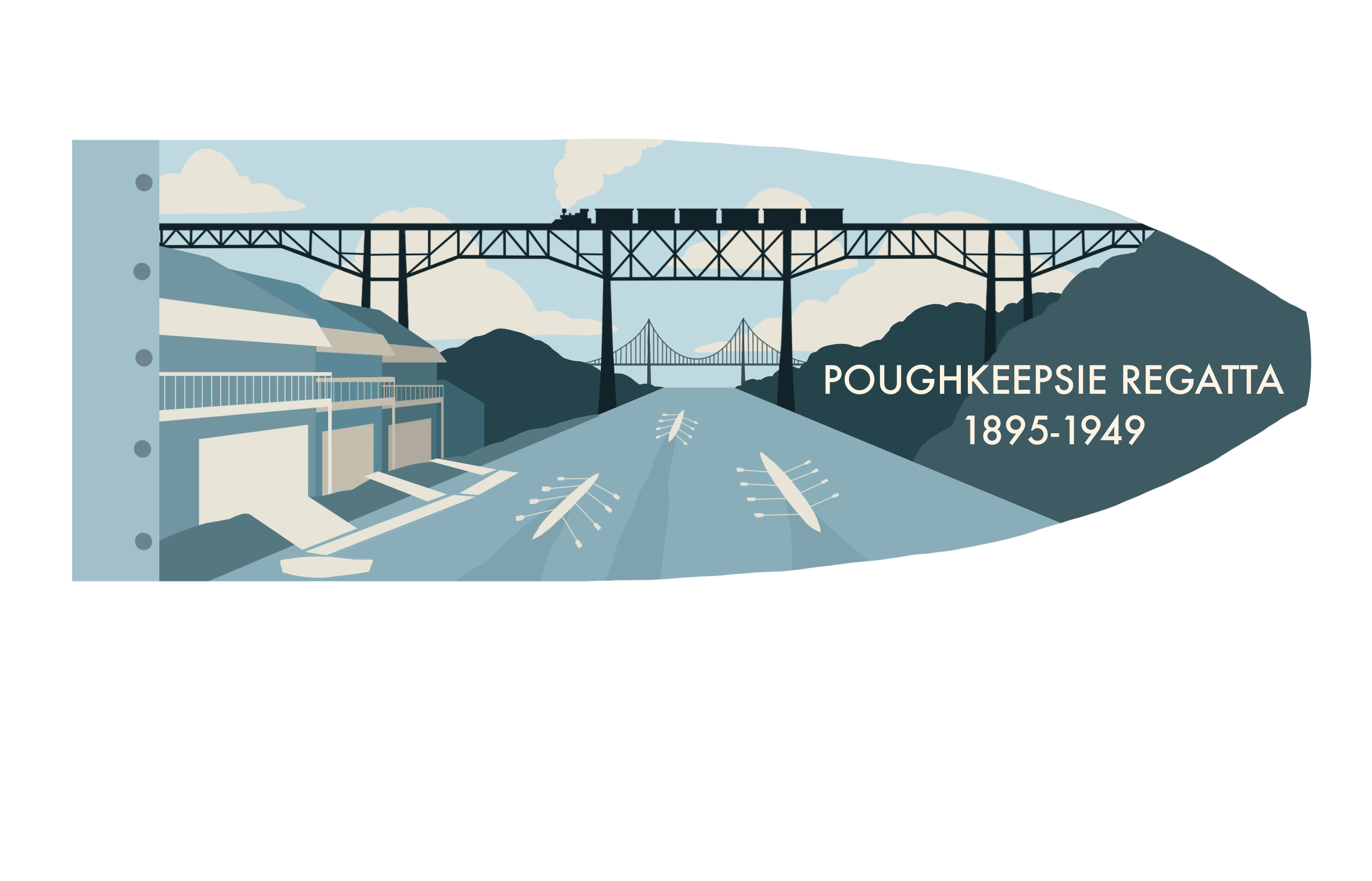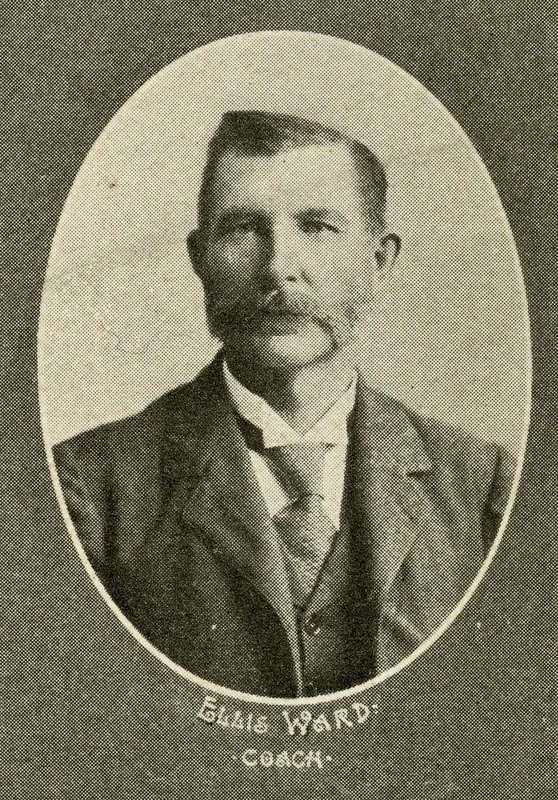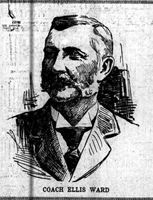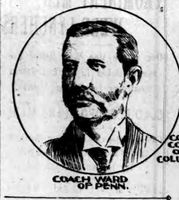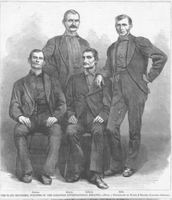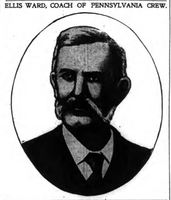Ellis F. Ward
Pennsylvania's Crew Coach 1879-1892, 1896-1913
Ellis F. Ward was an oarsman from an early age. He was born in 1846 along the Hudson River in Newburgh, New York. Ellis rowed and won his first race at the age of 17. He went on to win a number of races and set several records including a record for rowing a mile in five minutes and one second as a sculler. Ward's career as a sculler was overshadowed by the flashy or dramatic contests of his contemporaries, Edward "Ned" Hanlan and Charles E. "Pop" Courtney.
Despite this, Ellis and his brothers, particularly Josh, Henry and Gilbert, were among the best known oarsmen in the country. They rowed as a crew on Newburgh Bay from the 1850-1870s, winning a number of contests and making a name for themselves. In 1865, the Ward Brothers challenged the Biglin Brothers, another well-known family of professional rowers, to a five-mile race at Sing Sing. When the Ward Brothers beat them, winning the professional four-oared championship of America, it was not only a victory for them but for the pride of the Hudson Valley. Earlier that year, the Biglins had beat a local crew on the Hudson River at Poughkeepsie which caused a riot. In 1868, Ellis and his brothers (Josh, Gilbert, Hank, and Charles) along with Jere L. Raymond of Ossining, NY, defeated a Harvard crew at Worcester, MA. In 1871, they won the world championship at Saratoga Lake in the International Regatta in the four oared crews race.
Ellis eventually left professional rowing for coaching crews. His first coaching position was at Amherst College in 1873. He would continue to coach crews throughout the 1870s and 1880s including the Columbia Boat Club (Washington, D.C.), Fairmount Boat Club (Philadelphia), and Bohemian Boat Club of New York City. In 1879, he was hired as coach for the University of Pennsylvania crew.
For the first decade at Pennsylvania, Ward's salary and all equipment and facilities were paid by the College Boat Club and the Alumni Athletic Association. As a result, Ward had more freedom to experiment with strokes and equipment with his crews. This also led to conflict with the Boat Club. In 1887, he resigned for the season after an argument over the stroke he taught the crews. This was short lived as he returned the next year.
As time went on, the University began to exert more control over athletics and Ward again came into conflict with those in charge of the program. In 1891, the Pennsylvania crew was due to compete in the College Championship of America on Saratoga Lake, but shortly before the race, Ward decided to pull all of the varsity crew members including the second string of rowers from the boat as they were not up to his standards. He replaced them with a crew of substitutes who went onto the win the race. Ward resigned in January 1892 and was replaced with George Woodruff, who coached both the crew and the football team.
Ward did not return to Pennsylvania this time, from 1892-1895 he coached rowers at the Manhattan Athletic Club in New York City. In 1896, Woodruff found that he did have enough time to coach both the crew and the football team. So the University rehired Ward as coach of the crews. Also Pennsylvania's crews had not done as well competitively under Woodruff as they had under Ward.
Pennsylvania's crews became more successful under Ward and had back to back victories in the varsity race of the IRA regatta in 1898 at Saratoga Lake and 1899-1900 at Poughkeepsie. In 1901, Ward had one of his best crews ever, competing in the Royal Henley Regatta where they made it to the finals, one of the first American university crews to do so. They lost in the final to the Leander Boat Club, but this was a significant achievement for the program and Ward. Interestingly, Ward was almost unable to coach the crew during the races as coaching at the Henley was done on horseback or bicycle. Ward did not know how to ride either of these and thankfully a launch was arranged for him to use well downstream of the course.
Ward continued as coach at Pennsylvania until 1913. He was almost released in the fall of 1912, but it was decided to have him finish out his contract which was up in August of 1913. Pennsylvania crews were not doing as well in competition and the University felt a change was needed.
Ward did not return to coaching and instead settled down to work with his sons in the Ellis Ward and Sons Company, which manufactured oars, oarlocks, shells, and other equipment for rowing and yachting. His oars were used by the Argonauts at Henley and by universities including Wisconsin, Georgetown, Harvard, Yale, Columbia and Pennsylvania.
He continued in this job until the early 1920s. He suffered a stroke, which caused him to lose his voice, and confined him to his house for the year before his death in August 1922.
Ward's career spanned the development of professional and university rowing and was integral to the growth of both in the United states. He had the opportunity to experiment and develop techniques. He was one of the first to apply sculling techniques to sweepswinger rowing and his Pennsyvlania crews learned the stroke used by the Ward Brothers in their competitions. He also tried new rowing equipment including aluminum oars and shells. Ward was also an inventor and developed his own rowing equipment and held patents for roller-bearing oarlocks (given in 1885 and 1907).
He was inducted into the rowing hall of fame as a pioneer of rowing in 1960.
